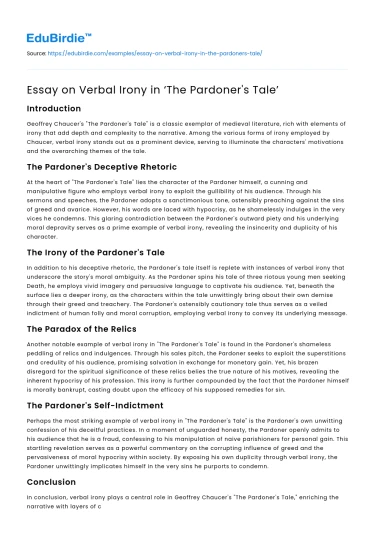Introduction
Geoffrey Chaucer's "The Pardoner's Tale" is a classic exemplar of medieval literature, rich with elements of irony that add depth and complexity to the narrative. Among the various forms of irony employed by Chaucer, verbal irony stands out as a prominent device, serving to illuminate the characters' motivations and the overarching themes of the tale.
The Pardoner's Deceptive Rhetoric
At the heart of "The Pardoner's Tale" lies the character of the Pardoner himself, a cunning and manipulative figure who employs verbal irony to exploit the gullibility of his audience. Through his sermons and speeches, the Pardoner adopts a sanctimonious tone, ostensibly preaching against the sins of greed and avarice. However, his words are laced with hypocrisy, as he shamelessly indulges in the very vices he condemns. This glaring contradiction between the Pardoner's outward piety and his underlying moral depravity serves as a prime example of verbal irony, revealing the insincerity and duplicity of his character.
Save your time!
We can take care of your essay
- Proper editing and formatting
- Free revision, title page, and bibliography
- Flexible prices and money-back guarantee
The Irony of the Pardoner's Tale
In addition to his deceptive rhetoric, the Pardoner's tale itself is replete with instances of verbal irony that underscore the story's moral ambiguity. As the Pardoner spins his tale of three riotous young men seeking Death, he employs vivid imagery and persuasive language to captivate his audience. Yet, beneath the surface lies a deeper irony, as the characters within the tale unwittingly bring about their own demise through their greed and treachery. The Pardoner's ostensibly cautionary tale thus serves as a veiled indictment of human folly and moral corruption, employing verbal irony to convey its underlying message.
The Paradox of the Relics
Another notable example of verbal irony in "The Pardoner's Tale" is found in the Pardoner's shameless peddling of relics and indulgences. Through his sales pitch, the Pardoner seeks to exploit the superstitions and credulity of his audience, promising salvation in exchange for monetary gain. Yet, his brazen disregard for the spiritual significance of these relics belies the true nature of his motives, revealing the inherent hypocrisy of his profession. This irony is further compounded by the fact that the Pardoner himself is morally bankrupt, casting doubt upon the efficacy of his supposed remedies for sin.
The Pardoner's Self-Indictment
Perhaps the most striking example of verbal irony in "The Pardoner's Tale" is the Pardoner's own unwitting confession of his deceitful practices. In a moment of unguarded honesty, the Pardoner openly admits to his audience that he is a fraud, confessing to his manipulation of naive parishioners for personal gain. This startling revelation serves as a powerful commentary on the corrupting influence of greed and the pervasiveness of moral hypocrisy within society. By exposing his own duplicity through verbal irony, the Pardoner unwittingly implicates himself in the very sins he purports to condemn.
Conclusion
In conclusion, verbal irony plays a central role in Geoffrey Chaucer's "The Pardoner's Tale," enriching the narrative with layers of complexity and moral ambiguity. Through the deceptive rhetoric of the Pardoner, the ironic twists of the tale itself, and the paradoxical nature of the relics he peddles, Chaucer invites readers to question the true motivations and values of the characters involved. By exposing the hypocrisy and moral bankruptcy inherent in the Pardoner's profession, "The Pardoner's Tale" serves as a timeless critique of human folly and moral corruption, rendered all the more powerful through the skillful use of verbal irony.






 Stuck on your essay?
Stuck on your essay?

